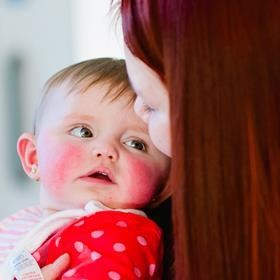Working with fathers in prison
Emma Burgess – Family Nurse Supervisor in Lambeth
The main focus of the Family Nurse Partnership is working with young, first time mothers. But the programme has always stressed the importance of working with and involving other family members where possible.
Fathers can, at times, get overlooked; their needs often overshadowed by the immediate needs and concerns of the pregnant women. So when I was approached by local commissioners in Lambeth and offered the opportunity to create some workshops for dads and dads to be in prison it was a project both me and my team felt very strongly about.
The request came from the fathers themselves, they wanted the chance to learn, grow and understand more about what they could do to have a positive impact on their child’s life.
Research continues to grow and evolve about the importance of fathers’ impact in their children’s lives. According to the report Fathers and Their Impact on Children's Well-Being: "Even from birth, children who have an involved father are more likely to be emotionally secure, be confident to explore their surroundings, and, as they grow older, have better social connections."
Not only this, the research states that:
"Children with involved, caring fathers also have better educational outcomes. The influence of a father's involvement extends into adolescence and young adulthood. Numerous studies find that an active and nurturing style of fathering is associated with better verbal skills, intellectual functioning, and academic achievement among adolescents."
Using a mix of the components we use in the three stages of the FNP programme (Pregnancy, Infancy and Toddlerhood) we created a bespoke programme combined with a toolkit that we would use in two two-hour sessions with fathers in prison.
We carried out pilot sessions in March and April this year. We were overwhelmed by how well they went. Having not done sessions like these before, we let the sessions flow and be guided by participants. This allowed for meaningful engagement and gave both the time and space for all participants to feel comfortable in expressing their thoughts and feelings, as well as sharing their own experiences. It was clear from the outset just how much participants valued the time to talk about their babies and children as well as learn from what we had to offer.
During the sessions, we explored practical baby care: nappy changing, bathing, feeding, immunisations, reducing the risk of cot death, toy and home safety. We also discussed brain development and emotional regulation, baby cues and communication, and spoke about the development of the foetus and what their partners experience during pregnancy, labour and birth, as well as feelings about becoming a dad and more. We used a combination of visual aids, creative activities, demonstrations and role play to convey the concepts and this really helped the participants engage meaningfully.
At the end of the final session, each dad was given a certificate that confirmed their attendance and praised their engagement over the two days. We felt it was vital to offer personalised feedback that expressed our thanks for their participation as well as a brief description of what we were really impressed with regarding their individual engagement and participation. They also had the opportunity to record a message to send back to their babies. The prison radio producer joined us at the end of the sessions and recorded their messages onto CDs, which the participants were then able to send to their children.
There was a huge sense of overall enjoyment and positivity. The dads said that they felt more confident in their roles as fathers, caring for their children and keeping them safe. They also spoke about how they felt more assured in how to interact with their children and very pleased that they had the opportunity to share their thoughts and opinions with us and the group.
Fathers in prison are physically removed from their children. But they still have a very significant impact on their lives. We know from the FNP programme - and in the context of this pioneering initiative, from pilot group feedback - how beneficial the workshops have and will be for future participants, their children and families.
Looking ahead, we plan to create a more robust evaluation of the programme in order to fully demonstrate its impact. We’re looking forward with hope and enthusiasm to continuing this work with HMP Brixton and having the opportunity to positively impact the lives of many more young people.
